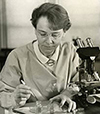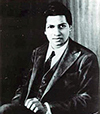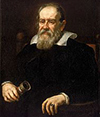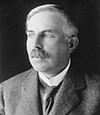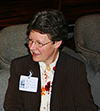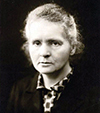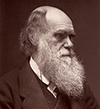Exemplars
The history of science is replete with exemplars of intellectual virtue. Many notable scientists exhibited one or more master intellectual virtues in their research endeavors. Below are examples of scientists that exemplified each of the master intellectual virtues.
Barbara McClintock, the 20th Century American geneticist, exemplified attentiveness. McLintock spent her career studying corn genetics, during which she noticed subtle changes in the shape of corn chromosomes which led to her Nobel Prize winning theory of transposable elements. Remaining completely focused on a particular task enabled McLintock to uncover details crucial to her important discovery. Other scientists that exemplify attentiveness include Alexander Fleming and Isaac Newton.
Srinivasa Ramanujan was a late 19th Century and early 20th Century Indian mathematician who exemplifies autonomy. Ramanujan made many contributions to pure mathematics, and had enormous capacity for self-directed, independent thinking as demonstrated by his intellectual contributions despite having no formal training in mathematics. Other scientists that exemplified this virtue include Humphry Davy and Alfred Russel Wallace.
G.H. Hardy was a late 19th Century and early 20th Century British mathematician exemplified carefulness. Hardy showed his propensity for sound thinking and avoidance of intellectual pitfalls through clear and rigorous arguments he made against poorly thought out ideas and schemes, such as the Tripos examination system at Cambridge University. Other scientists that exemplified this virtue include Niels Bohr and Rosalind Franklin.
Galileo Galilei, the 16th Century Italian physicist, exemplified courage. Galileo showed his willingness to take intellectual risks when promoting heliocentrism - the theory that Earth went around the Sun. Heliocentrism was contrary to the prevailing belief at the time, pitting him against the establishment, including fellow scientists and the Catholic Church, and thus he risked much more than just intellectual embarrassment. Other scientists that exemplify courage include Lynn Margulis and Linus Pauling.
Ernest Rutherford, the late 19th Century New Zealand physicist exemplified honesty. Rutherford was known for his work on nuclear physics but also for his keen awareness of the need to be fair and straightforward in one’s conduct, such as in authorship, and remaining transparent about the truth. Other scientists that exemplify honesty include Robert Boyle and Charles Babbage.
Dorothy Hodgkin was a 20th Century British chemist, who exemplified humility. Hodgkin was known for her Nobel Prize winning work on protein crystallography, but was never especially concerned about her status, but rather had a deep desire to collaborate on projects, both with competitors and others without her reputation. Other scientists that exemplify humility include Caroline Herschel and John Bardeen.
Jocelyn Bell Burnham, a 21st Century British astronomer exemplifies open-mindedness. Bell Burnham discovered the first evidence of neutron stars, for which her research mentor would share a Nobel Prize in Physics. Her discovery required her to entertain a very different interpretation of the truth of her data which went against conventional wisdom. Other scientists that exemplify open-mindedness include Joseph Priestley and Francis Crick.
Richard Feynman, the 20th Century American theoretical physicist, exemplified thoroughness. Feynman made important contributions to theoretical physics, but also to the Challenger shuttle disaster commission. Throughout his career, Feynman probed for deeper understanding and challenged conventional wisdom, in his research, teaching, and service. Other scientists that exemplify thoroughness include Ada Lovelace and Louis Pasteur.
Marie Curie was a late 19th Century and early 20th Century Polish-French chemist who exemplified tenacity. Known for her Nobel Prize winning work on radioactivity, Curie embraced long-term objectives and persisted even when confronted with challenges, both during her scientific training but also study of radioactive elements that took an enormous physical and mental toll. Other scientists that exemplified this virtue include Rita Levi-Montalcini and Nikolai Vavilov.
Notable exemplars of wonder include Charles Darwin, the British 19th Century evolutionary biologist. His inquisitive nature enabled him to ask the right questions in search of knowledge and understanding, both while travelling the world and when reflecting on his observations that questioning would ultimately result in the transformative theory of natural selection. Other scientists that exemplify wonder include Albert Einstein and Jane Goodall.
Sources
Albers, D.J., G.L. Alexanderson, and W. Dunham. 2015. The G.H. Hardy Reader. Cambridge University Press, Cambridge, UK.
Curie, E. 2001. Madame Curie: A Biography. De Capo Press, Boston, MA.
Desmond, A.J., and J.R. Moore. 1992. Darwin: The Life of a Tormented Evolutionist. Warner Books, New York, NY.
Ferry, G. 1998. Dorothy Hodgkin: A Life. Granta Books, London, UK.
Kanigel, R. 1991. The Man Who Knew Infinity: A Life of the Genius Ramanujan. C. Scribner's, New York, NY.
Keller, E.F. 1983. A Feeling for the Organism. W. H. Freeman and Company, New York, NY.
Krauss, L.M. 2011. Quantum Man: Richard Feynman's Life in Science. W.W. Norton, New York, NY.
McGrayne, S.B. 1993. Chapter 15: Jocelyn Bell Burnell. Pages 359-379 In Nobel Prize Women in Science: Their Lives, Struggles, and Momentous Discoveries. Birch Lane Press, New York, NY.
Reeves, R. 2008. A Force of Nature: The Frontier Genius of Ernest Rutherford. W. W. Norton & Co., New York, NY.
Reston, J. 1994. Galileo: A Life. Harper Collins Publishers, New York, NY.
